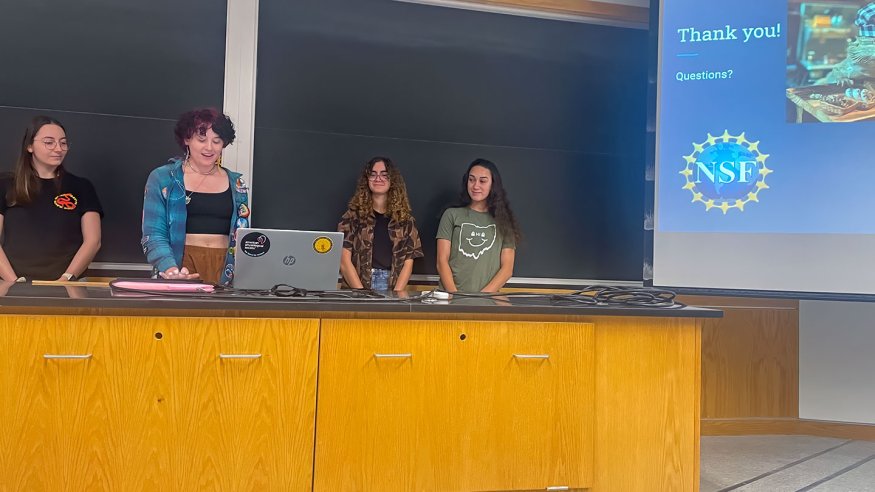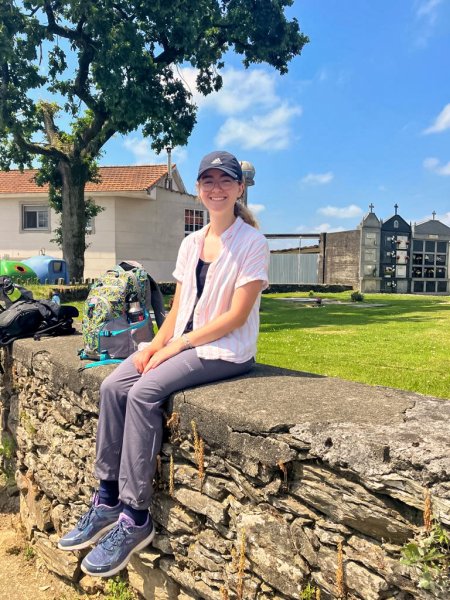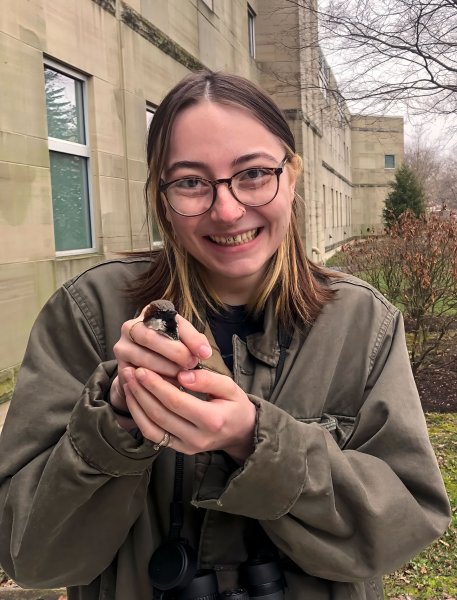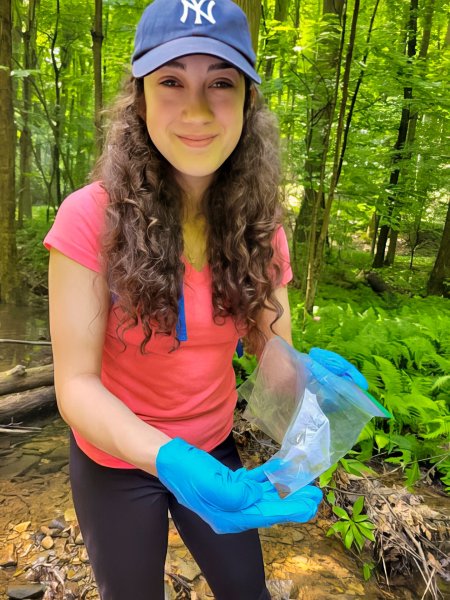
Evolving Abilities
Ohio Wesleyan Students Learn from Mentored, NSF-Funded Research



Name: Emma Foster ’26
Hometown: Sylvania, Ohio
High School: Sylvania Northview High School
Major: Neuroscience, Pre-Professional Zoology
Minor: Music Performance (cello)
Name: Logan Fraire ’24
Hometown: Trenton, Ohio
High School: Edgewood High School
Majors: General Zoology and Environmental Science
Name: Maya Moore ’24
Hometown: Jersey Shore, Pennsylvania
Major: General Zoology
Minor: Nutrition
OWU Connection Experience: Participating in Ohio Wesleyan’s 10-week Summer Science Research Program. The students were paid through a National Science Foundation (NSF) grant to conduct research in the Gangloff Lab of Amphibian and Reptile Ecophysiology (GLARE). The laboratory is overseen by Eric Gangloff, Ph.D., an OWU assistant professor of Biological Sciences.
In addition to Foster, Fraire, and Moore, Alyssa Head ’24 of Houston, Texas, also participated in the NSF-grant-funded project, and their work included volunteer assistance from Ethan Livingston ’24 of Toledo, Ohio, and recent OWU graduates Ali Amer ’23, Emily Bode ’23, and Sierra Spears ’22.
Our Research
“I am researching populations of Common Wall Lizards that live in Cincinnati, Ohio,” Foster says. “Our lab is interested in the lizards’ ability to thrive in an urban environment as an invasive species from northern Italy. We are currently investigating this question by looking at the lizards’ morphology, thermoregulation, and performance in relation to lead levels in the blood.”
Moore elaborates, adding: “I am conducting a research project focused on blood physiology using Common Wall Lizards (Podarcis muralis) as a model organism. I am specifically performing a lead toxicity project, where I quantify the amount of lead in the lizards’ blood and analyze their performance abilities (balance and endurance). I am hoping to find a relationship between blood lead concentration and performance. This research is important because it is related to public health and environmental concerns.”
In addition, Fraire concludes, “This research is important in understanding how behavior affects the progression of evolution.”
Lessons Learned
Foster: “This experience has taught me a lot about what fieldwork looks like. Things don’t always go as planned; some days are slower than others because of overcast weather. Time constraints often force us to get a lot of work done in one day. But despite its challenges, I enjoyed doing fieldwork because I was able to participate in very hands-on research while working with a group of similarly motivated individuals.”
Fraire: “The most important lesson I’ve learned from this experience is that I truly am a scientist. I have not felt any sense of imposter syndrome, and I feel very comfortable to make mistakes and learn humility from it. I feel that I can take this experience and apply it to any lab or life setting to establish myself as part of the team and someone who is able to make mistakes.”
Moore: “I chose the OWU SSRP because I wanted to work hands-on with animals and gain valuable scientific research experience that also provides transferable skills like writing, public speaking, problem-solving, critical thinking, patience, teamwork, adaptability, leadership, and attention to detail.
“I learned a lot from this experience, but one of the most important lessons I learned is that scientists are normal people, too. I think it’s a common feeling for STEM students to feel like they don’t belong or they’re not ‘smart enough’ or ‘good enough,’ but I’ve come to realize that science is for everyone. You don’t have to be the smartest, most experienced person in the room to do well in this field (if you are, you’re in the wrong room).
“Passion is just as important as education level, so some of the most beautiful moments in Cincinnati were when regular citizens, budding scientists, and professionals came together to discuss and indulge in the wonders of Common Wall Lizards.”
I once thought that I didn’t have enough interests to pursue grad school, but now I feel like I have too many interests thanks to my undergraduate research experiences.
Meaningful Mentoring
Foster: “I chose to work in the GLARE lab because I helped Dr. Gangloff with other lab projects throughout the academic year prior to this SSRP experience and respected his willingness to work with students and support their interests. ... He has helped me build up general research skills such as being able to collect and manage data efficiently and interpreting research papers. He has also encouraged me to think about creating a project focused on an aspect of neuroscience in the lizards to connect my interests in two seemingly different fields of research.”
Fraire: “Dr. Gangloff has helped me learn what a real science lab looks like, as this is my first experience working in a lab environment. I feel very comfortable with my postgrad journey after hearing his experience and his untraditional path to get where he is today. It’s comforting knowing that I don’t have to follow any kind of ‘traditional’ postgrad path.”
Moore: “Imposter syndrome is very real, but Dr. Gangloff has made me feel like I can do anything I set my mind to. It’s often difficult for me to recognize my personal qualities that are desired in the science field, but Dr. G. does so much to help me understand that I belong and am more than capable of pursuing and succeeding in a science career. Before the SSRP, I felt I wasn’t cut out for grad school, but he has inspired me to start researching graduate programs!”
Favorite Moments
Foster: “My favorite memory from my SSRP experience was finding a gray rat snake at one of our lizard sites in Cincinnati. While I like all reptiles, snakes are my favorite, so I enjoyed holding it for a while!”
Fraire: “My favorite moments from this experience are the bonding moments I shared with my lab coworkers and mentor. It feels much closer than most job environments, and I feel like I am truly a member of the lab who is respected and wanted in the environment.”
Moore: “My favorite moment from the SSRP was when the GLARE lab was invited to a behind-the-scenes tour of the Reptile House at the Cincinnati Zoo and getting up close and personal with the Galapagos Tortoises. That was an unforgettable experience.”
Campus Involvement
Foster: “Student organizations I am an active member of include Neurds Neuroscience Club (vice president), Reality Remix (vice president), Circle K, and Women in Science. I also play cello in the Chamber Orchestra and sing in the Choral Art Society at OWU.”
Fraire: “Outside of the classroom, I am very involved with the ENVS (Environment and Sustainability) Department. I was the sustainability coordinator last semester, and this year I will be the ENVS department manager. I am also a member of the ENVS Student Board. I have been in the Women in Science club for four years now and held an officer position for two years.”
Moore: “I was a member of Tree House for two years, an intern in the President’s Office for two years, and a member of Circle K for two years.”
Why Ohio Wesleyan?
Foster: “I was drawn to OWU because of the opportunities it gives students to explore multiple interests, work closely with faculty members on research projects as undergraduates, and study abroad.”
Fraire: “I chose to attend OWU for the travel and research opportunities. The small size of the school allows for such personal and intimate classroom and research settings with professors who are hard to find at bigger schools. All of my professors have been extremely encouraging and have pushed me in ways that have greatly benefited me and my career journey, from taking up a double major to traveling to Alaska to study plants and global change.”
Moore: “I chose Ohio Wesleyan for the small class sizes, the ease with which I could get one-on-one time with my professors, the OWU Connection, the willingness to help first-generation students, and the friendliness of everyone I met on my campus tour.
“I also love the comfort of being in a smaller town that is similar to my hometown, but one that is close to a large city like Columbus. I have witnessed immense personal growth in my confidence and independence since being a student at OWU.”
Plans After Graduation
Foster: “My current plan is to attend graduate school for neuroscience after completing my undergraduate education at OWU. My experience at OWU will prepare me for this by giving me opportunities to lead research projects as an undergraduate and a well-rounded education that encourages me to think critically about problems in the real world.”
Fraire: “After graduation, I plan to work in remote sensing for one to two years before entering grad school related to my work. OWU has prepared me greatly for this with niche classes to develop my technical skills and professors, such as Dr. Nathan Rowley (ENVS), who have shown me what career paths are available to me in remote sensing. Dr. Laurie Anderson (Biological Sciences, ENVS) has also helped develop my love for plants and ecology that I hope I can incorporate into my dream job of plant conservation work using remote sensing.”
Moore: “To be honest, I’m not sure what my plans are after graduation. I once thought that I didn’t have enough interests to pursue grad school, but now I feel like I have too many interests thanks to my undergraduate research experiences. As a liberal arts student, I have had the opportunity to take multiple different types of classes where my personal and professional interests intersect.
“Once I narrow down what I’d like to do with my career, I’ll hopefully attend graduate school and work hands-on with animals in the field again. OWU has taught me the importance of networking, and I have made great connections that will help advance my career.”
